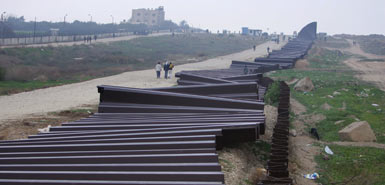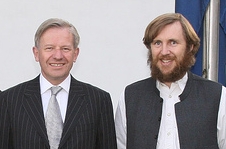Attacks imperil U.S.-backed militias in Iraq
American-backed Sunni militias who have fought Sunni extremists to a standstill in some of Iraq’s bloodiest battlegrounds are being hit with a wave of assassinations and bomb attacks, threatening a fragile linchpin of the military’s strategy to pacify the nation.
At least 100 predominantly Sunni militiamen, known as Awakening Council members or Concerned Local Citizens, have been killed in the past month, mostly around Baghdad and the provincial capital of Baquba, urban areas with mixed Sunni and Shiite populations, according to Interior Minister Jawad al-Bolani. At least six of the victims were senior Awakening leaders, Iraqi officials said.
Violence is also shaking up the Awakening movement, many of whose members are former insurgents, in its birthplace in the Sunni heartland of Anbar Province. On Sunday, a teenage suicide bomber exploded at a gathering of Awakening leaders, killing Hadi Hussein al-Issawi, a midlevel sheik, and three other tribesmen.
Born nearly two years ago in Iraq’s western deserts, the Awakening movement has grown to an 80,000-member nationwide force, four-fifths of whose members are Sunnis. American military officials credit that force, along with the surge in United States troops, the Mahdi Army’s self-imposed cease-fire and an increase in Iraqi security forces, for a precipitous drop in civilian and military fatalities since July.
But the recent onslaught is jeopardizing that relative security and raising the prospect that the groups’ members might disperse, with many rejoining the insurgency, American officials said. [complete article]
A lesson in how to create Iraqi orphans. And then how to make life worse for them
It’s not difficult to create orphans in Iraq. If you’re an insurgent, you can blow yourself up in a crowded market. If you’re an American air force pilot, you can bomb the wrong house in the wrong village. Or if you’re a Western mercenary, you can fire 40 bullets into the widowed mother of 14-year-old Alice Awanis and her sisters Karoon and Nora, the first just 20, the second a year older. But when the three girls landed at Amman airport from Baghdad last week they believed that they were free of the horrors of Baghdad and might travel to Northern Ireland to escape the terrible memory of their mother’s violent death.
Alas, the milk of human kindness does not necessarily extend to orphans from Iraq – the country we invaded for supposedly humanitarian reasons, not to mention weapons of mass destruction. For as their British uncle waited for them at Queen Alia airport, Jordanian security men – refusing him even a five-minute conversation with the girls – hustled the sisters back on to the plane for Iraq. [complete article]
Democrats attack Iraq security proposal
The leading Democratic presidential candidates and their allies on Capitol Hill have launched fierce attacks in recent days on a White House plan to forge a new, long-term security agreement with the Iraqi government, complaining that the administration is trying to lock in a lasting U.S. military presence in Iraq before the next president takes office.
Among the top critics is Sen. Hillary Rodham Clinton (D-N.Y.). She has used the past two Democratic presidential debates to blast President Bush for his effort, as she put it Monday in South Carolina, “to try to bind the United States government and his successor to his failed policy.”
Her concerns have been echoed by Sen. Barack Obama (Ill.) and other Democratic lawmakers who are focusing their fire on the administration’s plans for a long-term commitment to Iraq, after gaining little traction for their efforts to force a faster withdrawal of U.S. combat troops there. [complete article]

 through the breach surged some 350,000 Palestinians — fully one fifth of Gaza’s total population, as my friend and colleague
through the breach surged some 350,000 Palestinians — fully one fifth of Gaza’s total population, as my friend and colleague  The case of Irishman Michael Semple, who was acting head of the European Union mission in Kabul, is instructive. The fluent Dari-speaking Semple had spent over 18 years in Afghanistan in various capacities, including with the United Nations and as an advisor to the British Embassy in Kabul, before being expelled last month after being accused of talking to the Taliban. [
The case of Irishman Michael Semple, who was acting head of the European Union mission in Kabul, is instructive. The fluent Dari-speaking Semple had spent over 18 years in Afghanistan in various capacities, including with the United Nations and as an advisor to the British Embassy in Kabul, before being expelled last month after being accused of talking to the Taliban. [